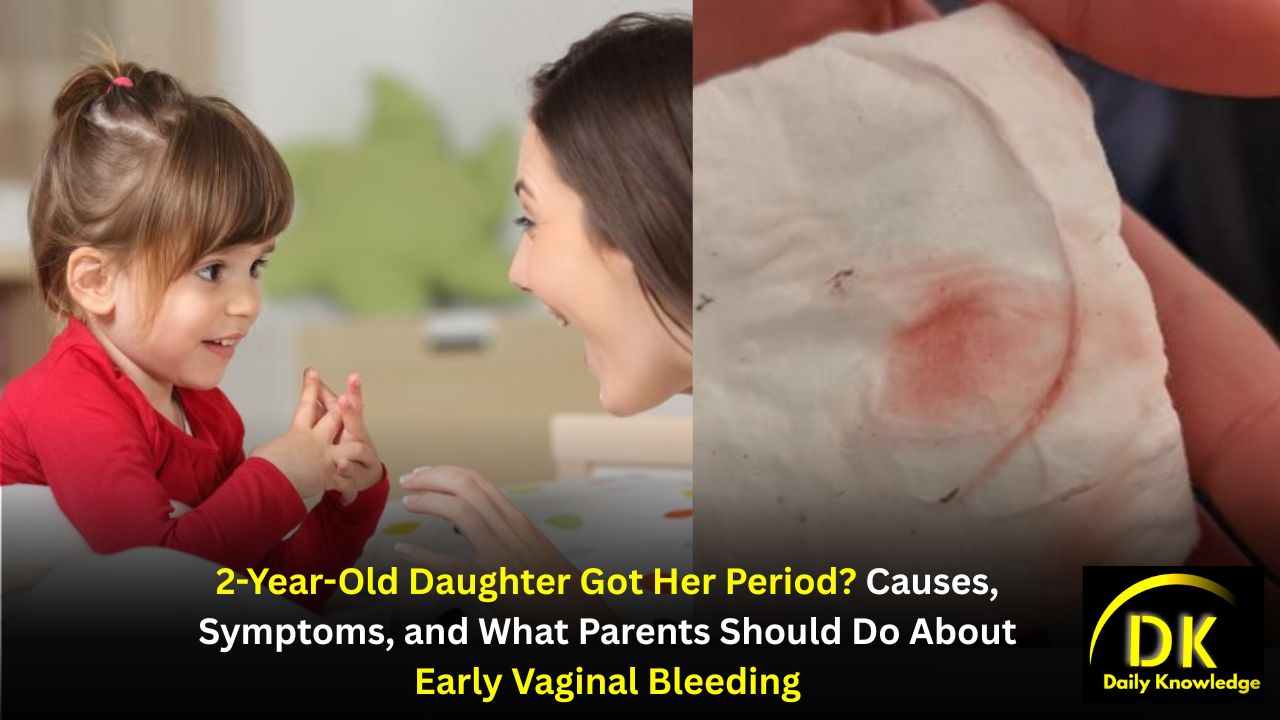Worried your 2-year-old daughter got her period? Learn the common causes of early vaginal bleeding, signs of precocious puberty, and essential steps parents should take. Expert advice on toddler menstruation, symptoms, and when to see a pediatrician. 2-Year-Old Daughter Got Her Period? Causes, Symptoms, and What Parents Should Do About Early Vaginal Bleeding
My 2-Year-Old Daughter Just Got Her Period: What Should I Do? – Early Vaginal Bleeding

Discovering that your 2-year-old daughter appears to have started menstruating can be shocking, confusing, and deeply troubling. As a parent, you want to do the right thing—not just for her physical well-being, but to safeguard her emotional health as well. In this comprehensive guide, we will explain what may be happening, why immediate action is crucial, and how to support your child through this unusual situation, all while using trustworthy medical advice and SEO-friendly best practices.
What Does Early Period in a 2-Year-Old Mean? – Early Vaginal Bleeding

Discovering that your toddler has vaginal bleeding is alarming. Menstruation, or a “period,” typically begins between ages 11 and 14, so spotting any bleeding in a 2-year-old is abnormal and requires immediate attention.
- Menstruation in toddlers is extremely rare and is often a symptom of an underlying medical problem.
- Early onset of menstruation is medically called precocious puberty.
- Sometimes, vaginal bleeding in toddlers can also be caused by infections, injuries, or foreign objects rather than actual menstruation.
Why early bleeding concerns parents:
- It often leads to confusion and worry.
- It’s a call to seek urgent medical evaluation.
- Untreated causes can affect the child’s growth and health.
Common Causes of Vaginal Bleeding in Toddlers- Early Vaginal Bleeding

Vaginal bleeding in toddlers can have multiple causes, and not all indicate a true period. Correct diagnosis is crucial.
Common causes include:
- Precocious puberty: Early hormonal changes that lead to menstruation.
- Infections: Yeast infections, bacterial vaginosis, or urinary tract infections cause irritation and bleeding.
- Trauma or injury: Accidental injury or abuse must be considered and ruled out.
- Foreign objects: Toddlers may insert objects into the vagina causing bleeding and infection.
- Skin irritation: Soaps, powders, or tight clothing can cause minor bleeding.
Is It Really a Period? Signs of early Puberty in Young Children- Early Vaginal Bleeding

The average age for a girl’s first period (menarche) is between 11 and 14 years. While some might experience it as early as 9, a period at age 2 is extremely abnormal and must be treated as a medical emergency.
In the vast majority of cases, vaginal bleeding in a toddler is not menstruation but a symptom of something else. Not all vaginal bleeding in toddlers is menstruation. Signs of precocious puberty can confirm if your child is starting puberty early.
Common signs of early puberty include:
- Breast development (even in toddlers)
- Appearance of pubic or underarm hair
- Body odor and acne development
- Rapid growth spurts
- Menstrual bleeding (rare before age 8)
Important note: Before menstruating, children usually show these secondary sexual characteristics.
Why this distinction matters:
- True precocious puberty needs medical diagnosis and treatment.
- Differentiates normal causes from serious medical conditions.
When Should Parents Worry About Toddler Vaginal Bleeding?- Early Vaginal Bleeding

Precocious puberty refers to the early onset of puberty (before age 8). Very rarely, some children may develop hormonal changes before this age, including breast budding or pubic hair. If the pediatrician diagnoses early puberty, they may refer you to a pediatric endocrinologist for ongoing evaluation and possible treatment.
Treatment options may include medication to pause pubertal progression. Early puberty can be stressful for children. Be sure to support her emotionally and seek mental health counseling if needed.
Any vaginal bleeding in a toddler should prompt medical evaluation. Certain situations require urgent care.
Warning signs to watch:
- Heavy or persistent bleeding
- Accompanying pain, swelling, or fever
- Visible injuries or bruises in genital area
- Other puberty signs appearing too early
- Behavioral changes or signs of distress
Immediate medical attention is needed if:
- Bleeding cannot be stopped after applying gentle pressure
- Child appears very pale, weak, or dizzy
- There is a suspicion of abuse or trauma
Immediate Steps to Take if Your Toddler Has Vaginal Bleeding- Early Vaginal Bleeding

If you notice bleeding, your first reaction can save time and ensuring your child’s safety.
Steps to follow:
- Stay calm and keep your child calm.
- Clean the area gently with warm water; avoid harsh soaps.
- Avoid using tampons or internal devices.
- Note details: When did bleeding start? How heavy is it? Any other symptoms?
- Call your pediatrician immediately for advice or an appointment.
- Seek emergency care if bleeding is heavy or if your child shows signs of weakness.
How do Female soldiers manage their Periods / Bathroom situations at War zones?
My 17-year-old daughter refuses to wear clothes due to periods
Read more…
How to Comfort Your Child During Unusual Health Issues?- Early Vaginal Bleeding

Toddlers don’t understand their bodies or medical explanations, so your support is crucial.
Tips to comfort your child:
- Use soothing language: “We’ll help you feel better.”
- Offer Comfort: Hold, cuddle, and reassure her. She is likely confused and may be frightened by your reaction.
- Provide physical comfort through hugs and closeness.
- Maintain routine to keep normalcy.
- Distract with toys or stories while you seek care.
- Protect Her Privacy: Limit conversations about this event to trusted adults and healthcare professionals only.
- Avoid showing panic as toddlers pick up on anxiety.
- Be Open-Minded at the Doctor’s Office: Sometimes, the doctor will need to examine your child’s genitals. This should always be done in your presence or that of a trusted caregiver.
Emotional support is as important as medical care.
Why You Should See a Pediatrician for Early Menstruation?- Early Vaginal Bleeding
Pediatricians specialize in children’s health and can identify underlying causes for bleeding.
What the doctor does:
- Performs a physical exam checking genital area, secondary sexual characteristics.
- Orders tests: blood work, hormone studies, imaging.
- Rules out infections, trauma, or endocrine disorders.
- Refers to pediatric endocrinologist if precocious puberty is suspected.
Prompt medical consultation is essential to prevent complications.
Possible Medical Conditions Behind Early Periods in Toddlers- Early Vaginal Bleeding
Several medical conditions can explain early bleeding:
- Precocious puberty: Early hormone secretion triggers bleeding.
- Hormonal imbalances: Thyroid or adrenal gland disorders.
- Bleeding disorders: Mild clotting abnormalities may cause spontaneous bleeding.
- Tumors or cysts: Rare but important to rule out.
- Infections or chronic inflammation: Causing fragile mucosal lining.
A thorough medical workup is essential to distinguish these causes.
Treatment Options for Precocious Puberty in Small Children- Early Vaginal Bleeding

If diagnosed with precocious puberty, treatment focuses on delaying further pubertal development.
Common treatments:
- GnRH agonists: Medications that pause puberty progression.
- Address underlying causes: Treat tumors, infections, or other conditions.
- Regular monitoring: Growth and hormone levels checked frequently.
- Supportive care: Emotional and psychological support for the child and family.
Treatment improves final adult height and emotional well-being.
Menstrual Hygiene Tips for Very Young Girls- Early Vaginal Bleeding
If your toddler is bleeding, safe and gentle hygiene practices are important.
Tips include:
- Use soft, unscented pads or panty liners — avoid tampons.
- Change pads every 4-6 hours or as needed.
- Wash genital area with warm water only, no harsh soaps.
- Avoid bubble baths or scented hygiene products.
- Dress in loose, breathable cotton clothing.
Good hygiene prevents infections and irritation.
What Parents Need to Know About Early Puberty Symptoms?- Early Vaginal Bleeding

Parents should recognize early puberty signs to act quickly:
- Breast tissue development
- Pubic or underarm hair growth
- Body odor or acne
- Growth spurts
- Mood swings or behavioral changes
- Early menstruation
Early identification leads to timely medical evaluation and intervention.
When to Seek Emergency Care?- Early Vaginal Bleeding
Seek immediate emergency care if your child:
- Is bleeding heavily and cannot be stopped
- Has fainted or is very pale
- Seems in pain or extremely lethargic
- Has visible injuries to the genital area
Final Thoughts: Your Role as a Parent- Early Vaginal Bleeding
Your calm presence, prompt action, and partnership with medical professionals are crucial to your daughter’s well-being. Remember, vaginal bleeding in a 2-year-old is extremely rare and always needs expert attention. Trust healthcare professionals, ask for support, and protect your daughter’s health and confidence every step of the way.
Frequently Asked Questions- 2-Year-Old Daughter Got Her Period? Early Vaginal Bleeding
Q1: Is it normal for a 2-year-old to get her period?
Ans: No, this is extremely rare and not considered normal. Seek immediate medical help.Q2: Should I talk to my daughter about periods?
Ans: At age 2, use simple, reassuring language and avoid detailed explanations.Q3: What could cause bleeding in a toddler’s genital area?
Ans: Hormonal issues, injury, infection, foreign object, or very rarely, precocious puberty.Q4: What if my toddler is bleeding but has no other symptoms?
Ans: Still get medical evaluation immediately—bleeding can be caused by infections or injury.

